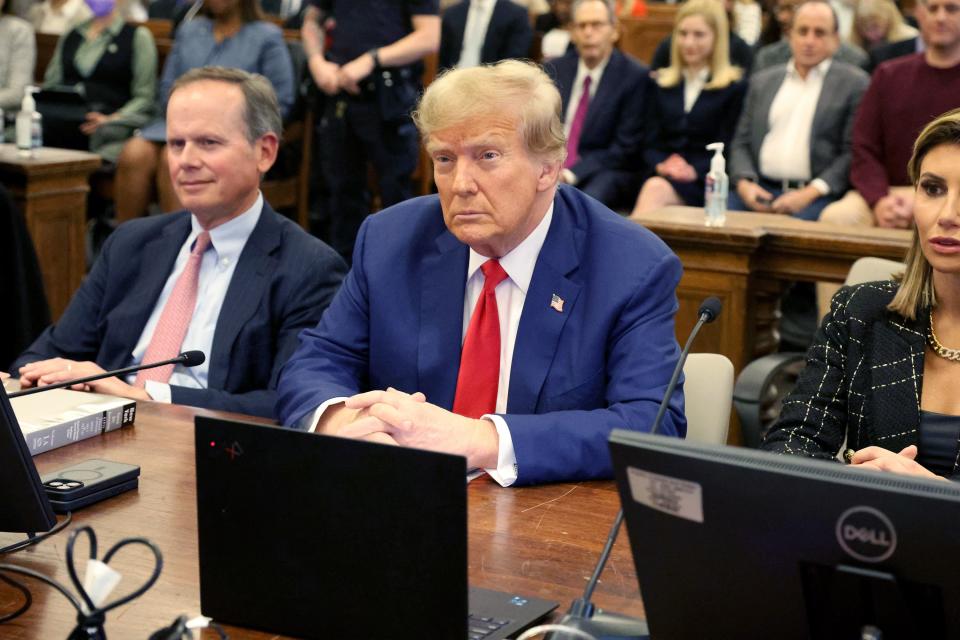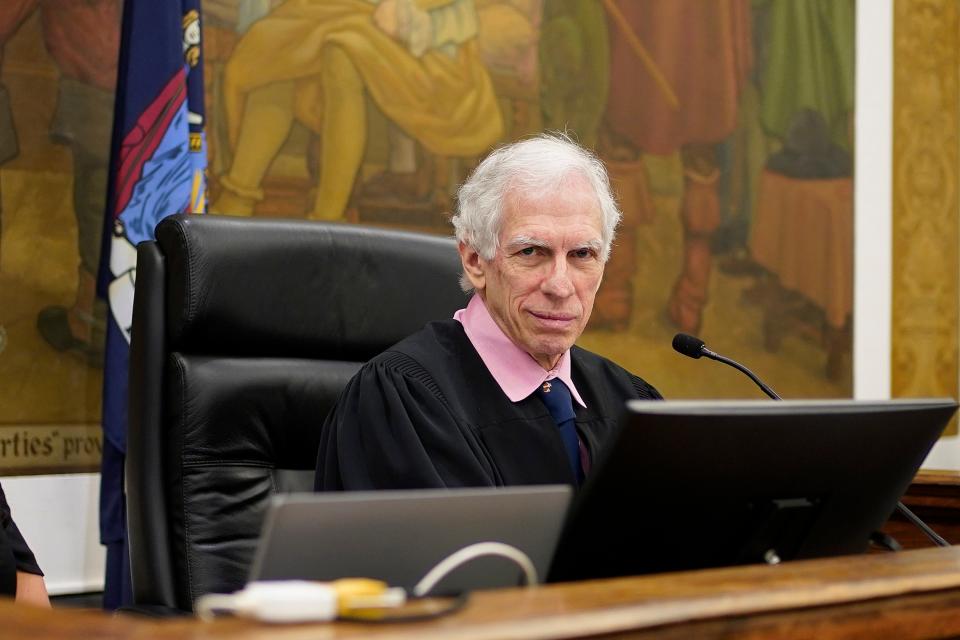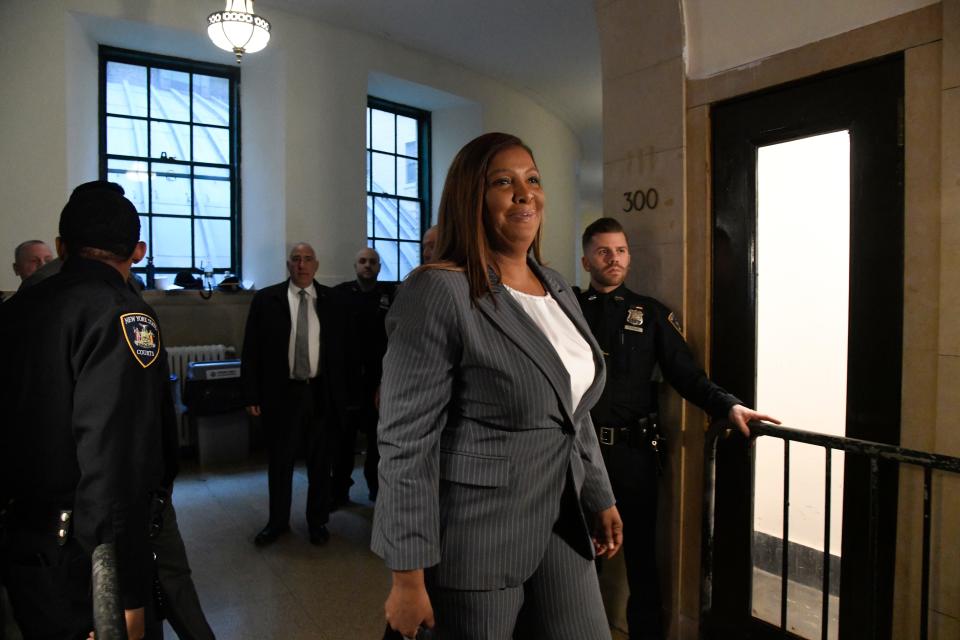'Control your client': Takeaways from closing arguments in Donald Trump's NY real estate fraud trial
NEW YORK — The day began with a bomb scare, peaked with a Donald Trump rant, and included a scolding from the judge. "Control your client," an exasperated state Supreme Court Justice Arthur Engoron admonished at one point in the closing arguments.
The former president insisted Thursday in the final hours of his New York fraud trial that the case was politically motivated and brought for publicity, drawing the curtain on proceedings that could bar him from running a business in the state and cost him hundreds of millions of dollars.
Trump, who was alleged to have exaggerated his personal wealth and real estate property values, called the case “a political witch hunt" against an innocent man.
"This is partially election interference, but in particular the person in the room right now hates Trump," he said, referring to New York Attorney General Letitia James, who brought the case.
Trump's comments came after Engoron, who earlier said Trump couldn’t give closing arguments after failing to agree to stick to the facts and law of the case, allowed him to speak.
Engoron has already found Trump liable for fraud and ordered the cancellation of his certificates to conduct business in New York, which the former president described as the "corporate death penalty." The judge has yet to rule on whether the former president will have to pay a hefty financial bill. James has requested $370 million from multiple defendants, but asked that Trump himself be held liable for most of that amount.
A government lawyer, Kevin Wallace, argued the trial showed Trump and his co-defendants engaged in intentional fraud. He said many factual details were settled, including that the defendants made inaccurate statements about property square footage and rent potential, and that every Trump financial statement from 2011 to 2021 was false.
"The most critical facts are undisputed," Wallace said. "Each individual defendant was acting knowingly and intentionally."
Engoron signaled some skepticism on Thursday about the case against Trump sons Don Jr. and Eric. "What evidence do you have, I just haven't seen it, that they knew there was fraud?" he asked government lawyer Andrew Amer.
The judge said he hopes to issue a decision by Jan. 31, though he couldn't guarantee it.
Here’s what we know about the case:

Trump criticizes judge to his face about case
Trump had railed against the judge and government lawyers throughout the 44-day trial – and continued in closing arguments.
Engoron issued a gag order against Trump to prevent him from criticizing the judge’s staff, and then fined Trump a combined $15,000 for two violations.
Trump has appealed the fines but an appeals court upheld the orders.
On Thursday, Trump focused his ire on Engoron, who didn’t include himself as a prohibited target in the gag order, and on James.
"You have your own agenda," Trump told Engoron. "I certainly understand that."
Engoron then stepped in, advising Trump lawyer Chris Kise to "please control your client."

Judge receives bomb threat at home but doesn't delay trial
The closing arguments weren’t delayed by a bomb threat Engoron received early Thursday at his Long Island home. Authorities found nothing amiss at the scene, in a case of apparent "swatting."
Extra security was visible around the courthouse.
"We've had layers of security around the courthouse and that is continuing," said Al Baker, a court spokesperson. "We've added extra security to ensure the safety of court proceedings."

What is the case about?
The lawsuit alleged Trump, his namesake company, sons Eric and Donald Trump Jr., and a couple of company executives overstated Trump's wealth and the value of his real estate to obtain benefits in loans and insurance.
Engoron ruled in September that Trump was liable for repeatedly committing fraud. The judge concluded Trump valued his Mar-a-Lago property at 20 times the tax assessment, that Trump Park Avenue apartments were valued millions of dollars above their appraised values on his corporate balance sheet, and that Trump nearly tripled the square-footage of his own Trump Tower penthouse apartment to hike its value.
The case could potentially halt Trump's ability to run a business or participate in the real estate industry in New York State, and force him to pay hundreds of millions of dollars. An appeals court temporarily halted Engoron's order canceling Trump's business certificates while the case is argued.
How did Trump respond to the allegations?
Trump, his sons Don Jr. and Eric, and daughter Ivanka each testified during the trial. Ivanka was initially part of the lawsuit, but is no longer a defendant.
His sons said they relied on accountants and other experts to maintain the appropriate financial documents, a point their lawyer hammered in closing arguments.
Trump has argued that there were no victims in the case because lenders such as Deutsche Bank knew to double check his financial records and their loans were repaid with interest.
"The banks are happy as can be," Trump said Thursday. "There wasn't one witness against us."
Before entering the courtroom, Trump, the 2024 Republican frontrunner, called the case “election interference at the highest level” and a “disgrace.”
Trump lawyer Kise argued to the judge that the attorney general was targeting Trump for a victimless offense.
"This attorney general wants limitless power," Kise said.
A second Trump lawyer, Alina Habba, described the case as politically motivated.
"You have been dragged through a political agenda," Habba said.
This article originally appeared on USA TODAY: Donald Trump claims political persecution at end of NY fraud trial
